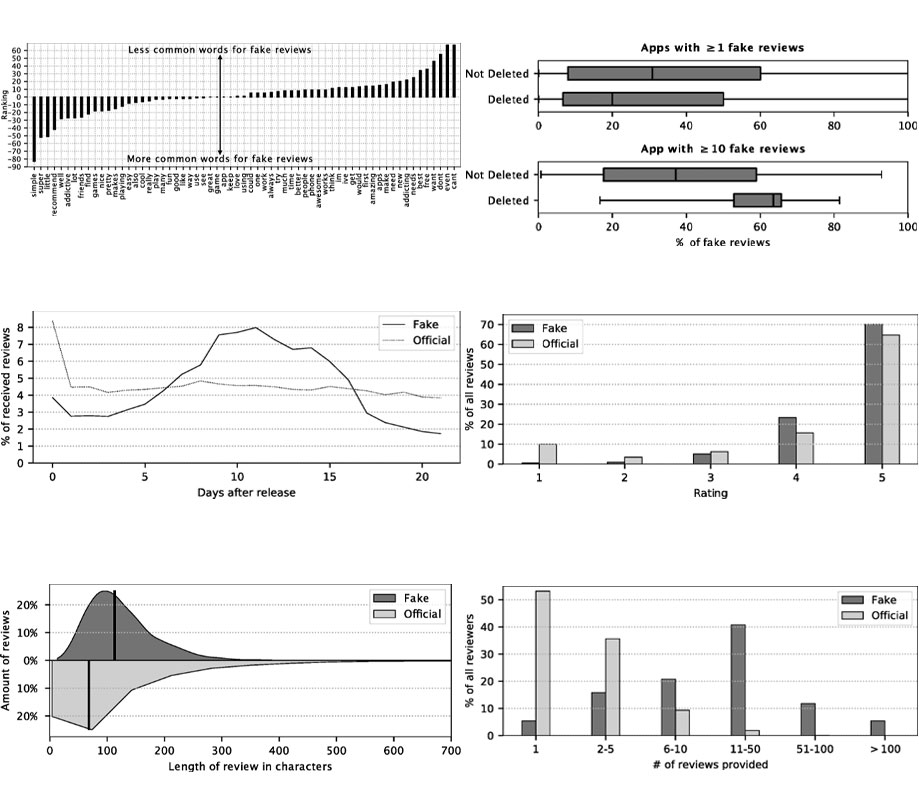Fake app reviews impact developers more than you think
Thursday, June 29, 2023

|
Freeman Lightner |

|
Richard Harris |
We explain the impacts of purchasing fake app store reviews, the unfairness to ethical developers, how to get real reviews, how to spot fake reviews, the significance of reviews, their influence on app store rankings, and the steps taken by Apple and Google to ensure authenticity.
Developers are well aware that a significant portion of online reviews for products and services, including those on popular platforms like Amazon, eBay, and TripAdvisor, are in fact fake. The issue of fake app reviews has become an increasingly pressing concern. These deceptive reviews have wide effects on both developers and consumers alike, significantly impacting the success and profitability of apps. Fake app reviews distort the overall user experience and undermine the integrity of app marketplaces, ultimately hindering the growth and success of both established and aspiring developers. In order to combat the effects of fake app reviews and uphold the integrity of the app stores, developers and app platforms must implement strategies to prevent and mitigate the use of such deceptive practices. Illegitimate reviews make up a significant percentage of app store reviews, with studies suggesting that anywhere from 10% to 30% of reviews could be fake.
10 ways fake app reviews impact developers
1. Inflated ratings: Fake reviews artificially boost an app's overall rating, creating a misleading perception of its quality and popularity among users
2. Increased downloads: Positive fake reviews can deceive potential users into downloading an app they may not have otherwise considered, leading to higher download numbers based on false pretenses.
3. Misleading user perception: Fake reviews skew the perception of an app's features, performance, and user satisfaction, potentially leading to disappointment and negative user experiences.
4. Unfair competition: Developers who resort to fake reviews gain an unfair advantage over honest developers, as their artificially inflated ratings and positive feedback can attract users away from genuinely high-quality apps.
5. Decreased user trust: Fake reviews erode user trust in the app store ecosystem, making it challenging for users to discern between genuine and fabricated reviews, and potentially leading to skepticism towards all app ratings and reviews.
6. Negative impact on revenue: While fake reviews may initially boost downloads, they can harm long-term revenue prospects. Dissatisfied users who discover the deception may abandon the app or leave negative reviews, affecting its reputation and potential revenue streams.
7. App store penalties: App stores have strict policies against fake reviews, and developers caught engaging in such practices may face penalties, including app removal, suspension, or expulsion from the app store platform.
8. Legal consequences: In some cases, using fake reviews may violate consumer protection laws, leading to potential legal repercussions for developers who employ these deceptive tactics.
9. Damage to developer reputation: The use of fake reviews can tarnish a developer's reputation within the industry and among users, affecting their credibility and future prospects.
10. Negative user feedback: When users discover fake reviews, they may express their dissatisfaction, frustration, or mistrust through negative feedback, further harming the developer's reputation and credibility.
It is important to note that these outcomes not only impact the developers who use fake reviews but also influence the overall app store ecosystem and user trust in app ratings and reviews.
But what about the app stores?
In many app marketplaces, including the Apple App Store and Google Play Store, such practices are strictly prohibited. Both platforms have guidelines and policies in place to combat fake reviews, and they employ various measures to detect and remove fraudulent activities. Violating these policies can result in penalties, including app removal, suspension of developer accounts, and even legal consequences.
Apple actively monitors and acts upon fake reviews and can expel your app from its app store if it is found to have fake reviews. Here is what Apple states about fake app reviews in their app store review guidelines, "If we find that you have attempted to manipulate reviews, inflate your chart rankings with paid, incentivized, filtered, or fake feedback, or engage with third-party services to do so on your behalf, we will take steps to preserve the integrity of the App Store, which may include expelling you from the Apple Developer Program."
15 iOS apps with fake reviews
- Facelab - Face Editor, Beauty
- T-Mobile Scam Shield
- Sprint Call Screener
- Hiya
- Livlot
- BeSticky - Sticker Maker
- Yaku
- Verizon Call Filter
- Katching
- Astrology & Daily Horoscope
- Lucky Life - Future Seer
- Translator Guru
- Robokiller
- Dizzi
- My Pulse-Heart Rate Monitor
The Google Play Store also takes fake reviews seriously and filters them out so malicious developers cant take advantage of users. It is becoming more common to see developers buy fake reviews for their app, which drives their downloads up, brings them more revenue, and nearly diminishes the 1-star reviews altogether. According to Google Play Stores app review guidelines, "Your reviews should reflect the experience you've had with the content or service you're reviewing. Don't post fake or inaccurate reviews. Don't post the same review multiple times. Don't post reviews for the same content from multiple accounts. Don't post reviews to mislead other users or manipulate the rating. Don't post reviews on behalf of others. Don't misrepresent your identity or your connection to the content you're reviewing." Like Apple, Google removes and bans apps once they are discovered with fake reviews. However, you can still find apps on the Google Play store with tons of fake reviews and predatory pricing plans and subscriptions.
How to spot fake reviews
Spotting fake reviews in the app store can be challenging, but there are some indicators that can help you identify potentially fake or manipulated reviews. Here are a few tips to spot suspicious reviews:
1. Overwhelmingly positive or negative: If you notice a significant number of reviews that are overly positive or negative, it could be a red flag. Genuine reviews tend to have a mix of opinions, reflecting the diverse experiences of users. An unusually high number of uniformly positive or negative reviews may indicate manipulation.
2. Similar or repetitive language: Fake reviews may use similar or repetitive language, as they are often generated or influenced by the same source. Look for patterns in the wording, phrases, or specific features mentioned in multiple reviews. Genuine reviews are more likely to have diverse and unique content.
3. Review timing: If you observe a sudden surge of reviews within a short period, especially with similar ratings and content, it might indicate a coordinated effort to manipulate the app's ratings. Genuine reviews tend to be posted organically over time.
4. Reviewer profiles: Take a look at the reviewer profiles. If you notice an excessive number of new or suspicious accounts that have only reviewed a single app, it could suggest fake reviews. Genuine users often have a history of reviewing multiple apps and engaging with various types of content.
5. Unverified purchases: In some app stores, users can indicate whether they have purchased or downloaded the app before leaving a review. Pay attention to reviews from users who have not verified their purchase, as it's more difficult to validate their actual experience with the app.
6. Unusual rating and review discrepancies: Check if there are significant discrepancies between the rating and the content of the review. For instance, if a review gives a low rating but includes a positive or unrelated description, it could indicate manipulation.
While these indicators can help identify potentially fake reviews, they are not foolproof. App stores also employ their own detection systems to identify and remove fake reviews. If you suspect fake reviews, it's recommended to report them to the app store, providing any evidence or details that support your suspicion. Ultimately, it's important to consider reviews collectively and focus on patterns and trends rather than individual reviews when assessing an app's reputation and quality.
Are fake reviews illegal?
In some ways yes, and there are governments that want to put a stop to them because it's ruining not just product & app discovery, but the way we do business with online retailers and even brick and morter stores. The Federal Trade Commission (FTC) recently proposed new rules to take aim at businesses that buy, sell and manipulate online reviews and testimonials. If the rules are approved, they’ll carry a hefty fine too of up to $50,000 for each fake review, for each time a consumer sees it. That could easily add up to millions of dollars in fines.

Where to get fake app store ratings
While it may be tempting to obtain fake ratings and reviews for your app, it's important to understand the implications. Several marketplaces, such as UseViral, SidesMedia, MediaMister, and more, offer the option to purchase fake reviews. Alternatively, you can acquire genuine reviews through gig economy websites like Fiverr, Upwork, Freelancer, and others. However, the most valuable and authentic reviews often come from friends, family, and coworkers who can provide genuine feedback free of charge. Despite the ease of obtaining fake reviews, developers should prioritize genuine feedback for the best long-term outcomes.
How it’s not fair to developers
Fake app reviews are not only unfair to users, but they are also not fair to developers who ethically work towards gaining authentic app reviews. Apps with large amounts of fake reviews can drown out good apps with a small number of reviews that are all genuine. It is not ethical or recommended to engage in activities such as purchasing or generating fake ratings for mobile apps. Fake ratings can mislead users and damage the reputation of the app and its developers. It's essential to build an app's reputation organically through genuine user feedback and positive experiences. Focusing on improving the app's quality, functionality, and user satisfaction is a more sustainable approach for long-term success.
It creates a distorted and dishonest environment that undermines the integrity of the app marketplace. Developers who resort to fake reviews may experience short-term benefits, such as artificially inflating their ratings or rankings, but it ultimately erodes trust in their app and can lead to severe consequences. Instead of seeking unfair advantages through fake reviews, developers should focus on creating high-quality apps that genuinely meet the needs of users. By delivering valuable experiences, developers can earn positive reviews and build a strong reputation, which will contribute to the long-term success and sustainability of their apps.

Do reviews really matter
Yes, reviews do matter for the app store. Reviews play a crucial role in shaping the perception of an app and influencing user decisions. Here are some reasons why reviews are important:
1. User trust and credibility: Reviews provide social proof and can significantly impact user trust and credibility. Potential users often read reviews to gauge the quality, reliability, and user satisfaction of an app before deciding to download or purchase it. Positive reviews can build trust and increase the likelihood of app installations.
2. App store rankings: Reviews, along with other factors like ratings and engagement, can influence app store rankings. Higher-rated apps with positive reviews are more likely to rank higher in search results and category charts. This visibility can lead to increased organic downloads and exposure to a larger user base.
3. User feedback and improvements: Reviews offer valuable feedback from users about their experiences with the app. Developers can gain insights into what users like or dislike, identify bugs or issues, and understand user needs and preferences. This feedback can help developers make improvements and updates to enhance the app's functionality and user experience.
4. Conversion rates: Positive reviews can positively impact conversion rates. When potential users see favorable reviews from others, they are more likely to trust the app's quality and features, leading to higher conversion rates from app page visits to downloads or purchases.
5. App Store Optimization (ASO): Reviews and ratings are essential elements of App Store Optimization. Positive reviews and higher ratings can contribute to better ASO performance, attracting more users, and increasing app visibility.
However, it's important to note that reviews are just one aspect of an app's overall performance and success. Other factors, such as app quality, functionality, marketing efforts, and user engagement, also play significant roles in an app's overall performance and growth.
How to get real reviews from real users
Getting real app store reviews from genuine users involves a combination of strategies to encourage user feedback and engagement. Here are some effective methods to obtain real app store reviews:
1. Prompt users within the app: Implement a well-timed and non-intrusive prompt within your app to ask users for feedback or to rate the app. You can display a pop-up message or a dedicated feedback section where users can easily provide their thoughts and ratings.
2. Incentivize feedback: Consider offering incentives to encourage users to leave reviews. For example, you can provide in-app rewards, access to exclusive content, or other benefits in exchange for their feedback. However, ensure that the incentives align with app store guidelines and avoid offering incentives specifically for positive reviews.
3. Engage with users: Actively engage with your users through various channels, such as social media, email newsletters, or an in-app community. Encourage them to share their experiences, suggestions, and feedback about the app. Engaging in conversations and responding to user queries or concerns can create a positive environment and increase the likelihood of users leaving reviews.
4. Implement rating prompts: Use rating prompts within your app that specifically target users who have demonstrated positive engagement or reached a milestone. For example, you can trigger a prompt to appear after a user completes a task or achieves a certain level of progress in the app. This increases the likelihood of receiving positive ratings and reviews.
5. Simplify the review process: Make it as easy as possible for users to leave a review. Provide clear instructions and a direct link to the app store review page. Streamline the process by pre-populating the rating and review fields, reducing friction and making it convenient for users to share their feedback.
6. Respond to reviews: Take the time to respond to user reviews, especially the negative ones. Show that you value user feedback by addressing their concerns, providing assistance, or expressing gratitude for positive reviews. Engaging with users in this way not only improves their experience but also encourages others to leave reviews.
Remember, it's important to abide by the guidelines set by app stores and maintain ethical practices. Avoid purchasing or soliciting fake reviews, as it can have severe consequences for your app's reputation and violate app store policies. Focus on providing a quality app, delivering value to users, and encouraging genuine feedback.

How reviews impact app store rankings
Apple App Store reviews play a significant role in determining app rankings and overall visibility within the App Store. While the exact algorithms used by Apple are not publicly disclosed, it is widely believed that app ratings and reviews influence the app's performance in search results and category rankings.
1. Relevance: Reviews provide insights into user experiences, satisfaction, and the quality of an app. Apple considers the relevance of reviews to determine the app's suitability for specific user searches. Positive reviews that highlight the app's features and benefits can increase its relevance and improve rankings.
2. Engagement: User engagement is a crucial factor in app rankings. Reviews demonstrate that users are actively using and interacting with the app. A high volume of positive reviews and ongoing user engagement can signal to Apple that the app is popular and valuable, potentially leading to higher rankings.
3. Conversion rates: The number and quality of reviews can influence the app's conversion rates. A positive rating and favorable reviews can instill trust in potential users and encourage them to download the app. Higher conversion rates can positively impact an app's rankings by indicating that it is well-received by users.
4. Ratings: The overall rating of an app also plays a role in rankings. Higher ratings tend to improve an app's visibility, as users generally prefer apps with better ratings. An app with a low average rating may face difficulties in ranking well in search results or category charts.
It's important to note that the App Store ranking algorithm is complex and considers multiple factors, including downloads, engagement, and other app performance metrics. While reviews are an influential aspect, they are not the sole determining factor in app rankings.
How do reviews even get into the app store for apps anyway? Is there a protocol Apple or Google takes to insure reviews are real?
Both Apple and Google have protocols and measures in place to ensure that reviews in their respective app stores are authentic and reliable. While the exact details of their processes are not publicly disclosed, here is an overview of how they work to maintain the integrity of reviews:
1. User verification: Both Apple and Google require users to have a valid account and be logged in to leave a review. This helps verify the identity of the user and adds a layer of authenticity to the review process.
2. Moderation and content guidelines: Apple and Google have established guidelines and policies that outline what is acceptable and prohibited in app reviews. These guidelines aim to prevent fake, spam, or inappropriate reviews from being published. Reviews go through a moderation process where they are reviewed by human moderators or automated systems to ensure compliance with these guidelines.
3. Fraud detection: Apple and Google employ various techniques and algorithms to detect fraudulent activities, such as fake reviews or review manipulation. They use data analysis, machine learning, and pattern recognition to identify suspicious patterns, review farms, or attempts to artificially boost ratings. If such activities are detected, the reviews may be removed, and penalties can be imposed on the app or developer.
4. User reporting: Both platforms allow users to report reviews they believe violate the guidelines. Users can flag reviews as inappropriate or fraudulent, providing an additional layer of community-driven moderation.
5. Continuous monitoring: Apple and Google continuously monitor the app stores for any signs of review manipulation or fraudulent behavior. They actively work to improve their systems and algorithms to stay ahead of new techniques used to game the review system.
By implementing these measures, Apple and Google aim to provide users with reliable and trustworthy reviews that help them make informed decisions about downloading and using apps.
Fake app reviews charts
Image credits: Daniel Martens and Walid Maleej


Become a subscriber of App Developer Magazine for just $5.99 a month and take advantage of all these perks.
MEMBERS GET ACCESS TO
- - Exclusive content from leaders in the industry
- - Q&A articles from industry leaders
- - Tips and tricks from the most successful developers weekly
- - Monthly issues, including all 90+ back-issues since 2012
- - Event discounts and early-bird signups
- - Gain insight from top achievers in the app store
- - Learn what tools to use, what SDK's to use, and more
Subscribe here

_r2f0ox12.jpg&width=800)










